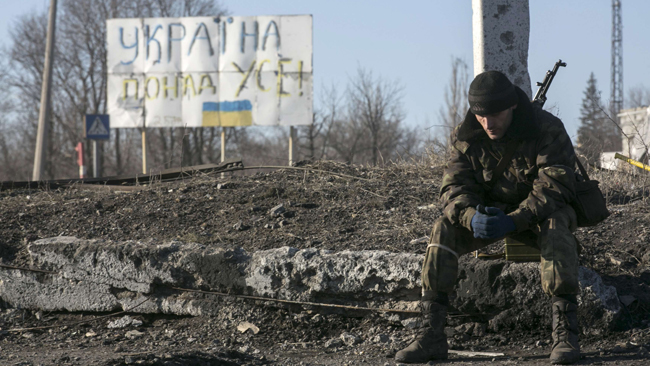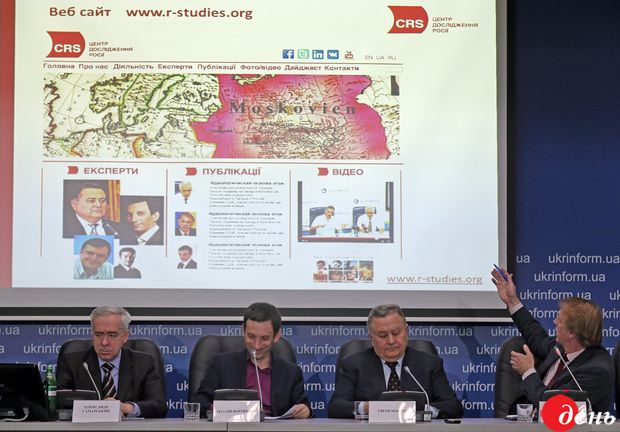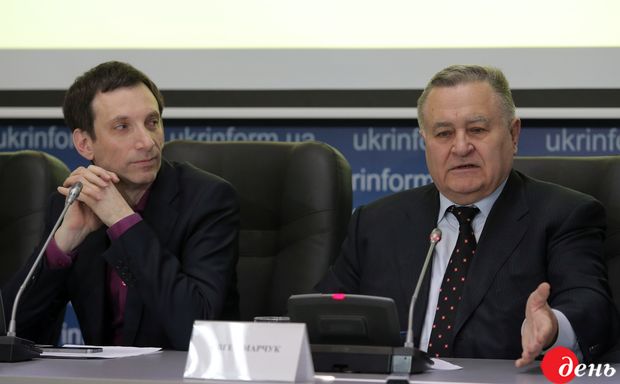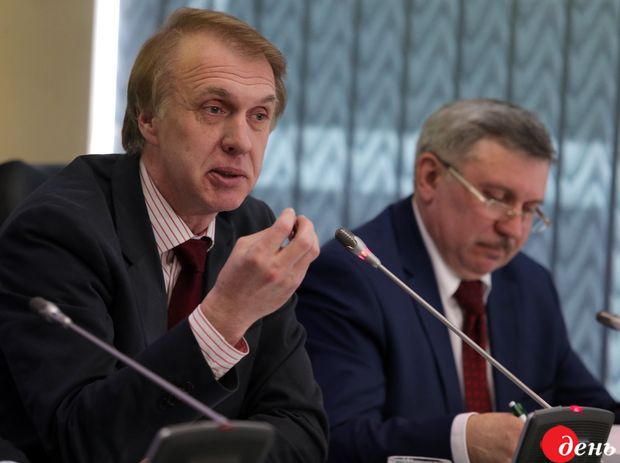Threshold of pain
How can the Kremlin be stopped? The Day turned to experts of the newly-established Center of Russian Studies
March 18 saw the launching of the Center of Russian Studies which has gathered experienced experts for a thorough analysis of the process now underway in the neighboring country. Opening a press conference, ex-foreign minister Volodymyr Ohryzko explained that this institution was established because nobody had addressed this problem in the past decade.
“It was a common assumption in the early 1990s that Russia would suddenly turn from a totalitarian Soviet Union into a democratic Phoenix with a beautiful well-washed face. But, in reality, this face remained the same, which has become clear in the past days and months. This makes it necessary to find out what is really going on in the Russian Federation, how it plans to live in this world, in what way we and other countries should build relations with that country because, much to our regret, no in-depth analysis of this problem has ever been made either in Ukraine or in Western countries. We have a unique entity which will exclusively study the Russian Federation,” Mr. Ohryzko said.
Yevhen Marchuk, who held the offices of prime minister, security service chief, minister of defense, and National Security and Defense Council secretary, pointed out that Ukraine, particularly during the Yanukovych presidency, had pulled the plug on gathering information and intelligence about Russia.

CENTER OF RUSSIAN STUDIES’ WEBSITE IS WWW.R-STUDIES.ORG
Mr. Marchuk rejected the claim of many experts that it was impossible to predict Putin’s behavior. “I used the information that was openly circulating in the media and can say that it was possible to forecast the annexation of Crimea,” he said. As for the fact that Russia’s behavior – aggression against Ukraine – was a surprise to many Ukrainians, Mr. Marchuk put this down to the complete absence of attempts to gather information and intelligence about Russia.
“We can see today how important it is to know what Russia is, above all, in terms of defense and security. A simplistic interpretation of Putin’s personality at the outset of the aggression – that he lacks foresight, that sanctions and crisis will suppress him, and speculations about his health – seriously blurs the picture of Russia as an aggressor, as an enemy in the literal sense of the word. We should not mince words: the Russian military are killing Ukrainian soldiers on Ukrainian land and shelling cities. For this reason, the work of our center will be also of interest to this country’s leadership. But the main goal will be to keep society informed and make long-term forecasts about Russia. We must know Russia very well and vary the tactical and strategic aspects of our relations, particularly and above all in the defense, security, and energy sectors,” Marchuk emphasized.

YEVHEN MARCHUK: “THE MECHANISMS AND STRUCTURES CREATED IN POSTWAR EUROPE PROVED TO BE INEFFECTIVE AND MUST BE REPLACED WITH OTHER, REALLY VIABLE, ONES”
On his part, the Ukrainian political journalist Vitalii Portnikov, who has been spotlighting events in Russia for many years, stressed that Ukraine should focus more on its own audiences. “We must remember that the information space, in which Moscow can broadcast to Kyiv, Minsk, Astana, and other post-Soviet cities, has been created in the course of centuries on the territory of the Russian Empire and the Soviet Union. A true Ukrainian independence will begin with independence from the Russian-language space,” the political journalist said. “We must be aware today,” Portnikov emphasized, “that Ukraine and Russia are two different worlds on two different continents of time and civilization. We should understand that the Russian [media] content is a travel to the past. Russia is in the remote past, with an absolutely different political and moral mentality than the world that surrounds it. Unless we understand this, we will be losing all the time, without fathoming the true level of threats.” He finally expressed a hope that the Center of Russian Studies would help Ukraine respond to these challenges.
Energy expert Mykhailo Honchar believes that Russia has finished the first phase of a hybrid war. Given a helpless and sluggish reaction of the West, the Kremlin is getting ready to launch an outright invasion and sound out other countries in order to see what will be the response of the EU and NATO.
“We want to take an integrated, not piecemeal, approach to the Russia-related problems, take a view from various sides of the informational, military, energy, politico-diplomatic, and other sectors. We will thus see an ample picture of what is going on and what recipes can be offered,” he said, explaining the new center’s goal.
As the presentation was drawing to a close, experts answered The Day’s question: “How can the Russian aggression be stopped and Putin be forced to return Crimea?”

VOLODYMYR OHRYZKO: “WE ARE GOING NOT TO MAKE A PHOTO ALBUM OF BUT TO ANALYZE REALITY. THE OBJECTS OF OUR STUDIES WILL BE PEOPLE IN WASHINGTON, LONDON, BERLIN…”
In particular, Mr. Marchuk pointed out that we know only too well that we will not overcome Russia by means of a war. “However, I do not approve of saying too often, especially in the upper political echelons, that there is no military solution of this problem,” he explained. “This claim is right, but we are not going to attack Russia and seize Moscow. It is about liberation of the captured territory. We cannot resign ourselves to the fact that a part of our territory is occupied by the Russian troops. But, on the other hand, I must say that a position during any political negotiations is stronger and more convincing if the president has the minister of defense standing behind his back.”
Mr. Marchuk also emphasized: “Ukraine should understand that nobody will fight for us. We should reject the ever-sounding rhetoric of our partners that there is no military solution of this problem because diplomacy is always weak without a military component. For any diplomacy has a subtext – what strength do you have in addition to the world partners’ support? On the other hand, knowing that nobody except for us will be fighting does not mean that we will be able to counter Russia on our own with great pains and enormous casualties when that country engages the second gear of escalation. Therefore, it is, of course, extremely important for us to maintain as intense cooperation with our partners as possible. I am absolutely convinced that no sanctions will stop Putin. What can stop him are disproportionately heavy losses of personnel and equipment in case of further escalation.”
Therefore, he stressed, there are several ways to stop Putin. Firstly, the entire nation needs to rally together. Secondly, our partners should understand the need of reinforcing our army with lethal, especially antitank and antiaircraft, weapons. And, thirdly, it is economic sanctions which do not scare Putin but create very serious problems.
Portnikov thinks Ukraine should use the experience of Finland which built the Mannerheim line, which after all stopped Russia. Although Finland lost some of its territory as a result of this war, it kept its independence and sovereignty intact. It did not become a communist country, lived on to see the Soviet Union’s collapse, and joined the EU. Therefore, in the political journalist’s view, Ukraine should “dig in and wait for the downfall of the Russian Federation.” “That country won’t live long, and its statehood is a temporary and chance phenomenon. By all the laws of history, a state like this should not have emerged on the political map. And we manage to dig in and form a strong line of defense, if we isolate the occupied territories and spend not a single penny until we regain control over these territories, we will win,” he said.
Ohryzko recalled the words of Frederick the Great that negotiations without an army is the same as an orchestra without musical instruments. “When it is said that there is no military solution of the conflict, it is true. But nor is there a purely diplomatic solution of the conflict. So, we should mull over a combination of all the possible instruments of which my colleagues have been speaking in order to defend our national interests. It is the essence of our work to offer decision-makers various options,” the diplomat said.
It only remains to hope that the Ukrainian leadership will heed the experts’ advice and will not be spontaneously making important political decisions about, first of all, this country’s national security.
Newspaper output №:
№19, (2015)Section
Topic of the Day





